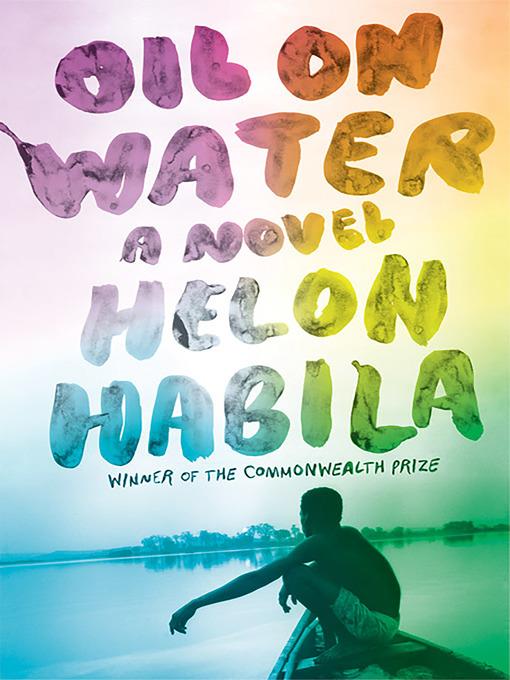
Oil on Water
A Novel
کتاب های مرتبط
- اطلاعات
- نقد و بررسی
- دیدگاه کاربران
نقد و بررسی

Starred review from March 7, 2011
In Habila's stirring third novel (after Measuring Time), a pair of Nigerian reporters are dispatched to find the kidnapped wife of a British oil executive. Young Rufus and his disgraced mentor, Zaq, track the wife's captors—guerrilla forces fighting against the petroleum industry and its government allies—through the lush Nigerian delta, wandering along oil-slicked rivers, villages destroyed by war, and communities evicted by a land-hungry oil company. Rufus, whose own family has been shattered by the oil industry's machinations, bears witness to pointless cruelties inflicted by both sides of the conflict and the suffering of a population uprooted and set adrift on a desecrated landscape. The novel is a cinematic adventure and a remarkably tense race against the clock set in a haunting world of mangroves, floating villages, and jungle shrines—but it is also a brooding political tragedy in the Graham Greene tradition, one that illustrates the environmental and human costs of resource extraction in corrupt, postcolonial Africa. The delta and its people are rendered with insight and sensitivity, but also an unsparing sense of irony; indeed, it's a credit to Habila's storytelling that his mournful vision of the world never eclipses its fragile beauty, or its humanity.

March 15, 2011
While searching for a foreign hostage, two reporters witness the despoliation of Nigeria in Habila's (Measuring Time, 2007, etc.) latest, shortlisted for the Commonwealth Prize.
The stink of oil and the orange light of gas flares emanate from this graphic account of a nation ruined by the extraction of its natural resources, in a narrative that is part political diatribe, part detective story. The quest to find Isabel Floode, the kidnapped wife of a white petroleum engineer, lures journalist Rufus and his older colleague Zaq out of Port Harcourt into the liquid landscape of the Niger delta, where beauty and subsistence have fallen victim to ecological nightmare and the violent clash between the military and the militants. Rufus is the lens through which Habila exposes the horrific landscape of poisoned wildlife and deserted villages, and the hopelessness of the people, robbed of their land, squeezed between avaricious forces. Witnessing scenes of massacre, migration and strange worship, Rufus remains unscathed even when abducted by a crazed soldier named the Major and then the rebel leader, the Professor. Finding Isabel, and also a love interest for himself, his journey ends in unconvincing optimism.
Dreamy, criss-crossed with flashbacks and pipelines, a memorable if heavily delineated parable of the dispossessed.
(COPYRIGHT (2011) KIRKUS REVIEWS/NIELSEN BUSINESS MEDIA, INC. ALL RIGHTS RESERVED.)

April 15, 2011
In this latest novel from Nigerian-born Habila (Measuring Time), winner of the Commonwealth Prize for Waiting for an Angel as well as the Caine Prize for African Writing, journalists Rufus and his idol, the has-been Zaq, hunt through the polluted Niger delta for the wife of a British oil executive--and for the big story that will save their careers. The local militants use kidnapping to fund a war with the Nigerian army and the international oil companies, whose activities have polluted the delta waters and displaced entire villages. As they navigate the rivers of the delta, with its devastated villages, army bases, and rebel camps under the shadow of the gas flares that light up the sky, and witness the awful violence and environmental destruction, the two men eventually find themselves in search of their own lives. VERDICT The accessible writing style and the focus on personal stories will appeal to a wide range of American readers, including those new to African fiction. And while Oil on Water lacks the level of historical and cultural background found in works by Chimamanda Ngozi Adichie, readers will find much to appreciate here.--Pamela Mann, St. Mary's Coll. of Maryland, St. Mary's City
Copyright 2011 Library Journal, LLC Used with permission.

Starred review from April 15, 2011
Young Nigerian journalist Rufus joins his idol, Zaq, a dissipated and world-weary reporter, to follow the story of a kidnapped oil executives wife. The journey to find the wife, at the behest of their editors and the wealthy husband, takes the pair into dangerous territory, villages devastated by pollution from oil exploration and by violence between militants and government soldiers. They travel through an otherworldly land of islands and rivers caught between the lure of the small rewards of oil money, on one hand, and pollution, violence, and the ruin of old customs on the other. They encounter a maniacal militant leader addicted to casual cruelty, a mysterious spiritual sect, a chief fighting to maintain the cohesion of his village from the temptations of oil money, and modest villagers threatened by the disparate interests of militants and oil companies. They also confront their own dark pasts, Zaqs of corrupted idealism and Rufus of family tragedy and loss tied to the heartless forces of change. In a beautiful, almost cinematic style, Habila moves back and forth in time to tell a story swathed in the cynicism of modern global development and the mysteries of human longing.(Reprinted with permission of Booklist, copyright 2011, American Library Association.)

























دیدگاه کاربران